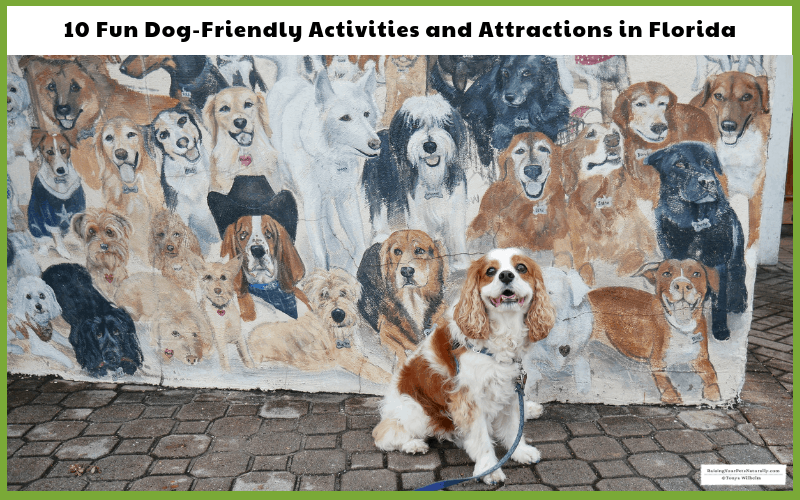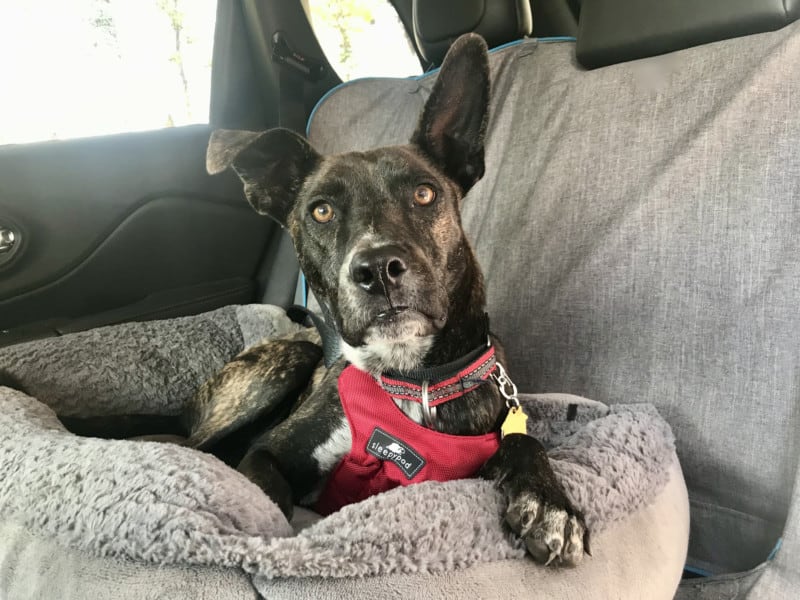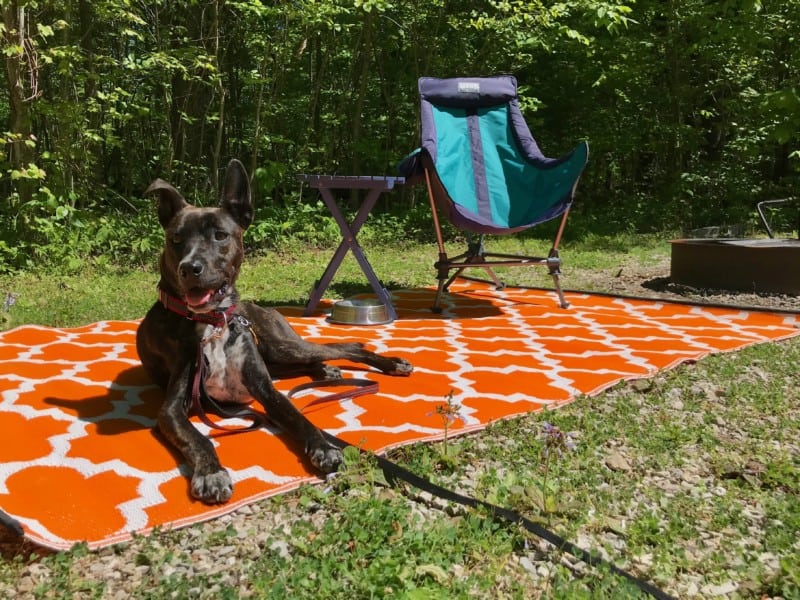Planning A Road Trip With Pets
You’ve been dreaming about it forever, and it’s finally happening … you’re planning a road trip with your pets! With a little preparation and some forethought, your trip will come off without a hitch.
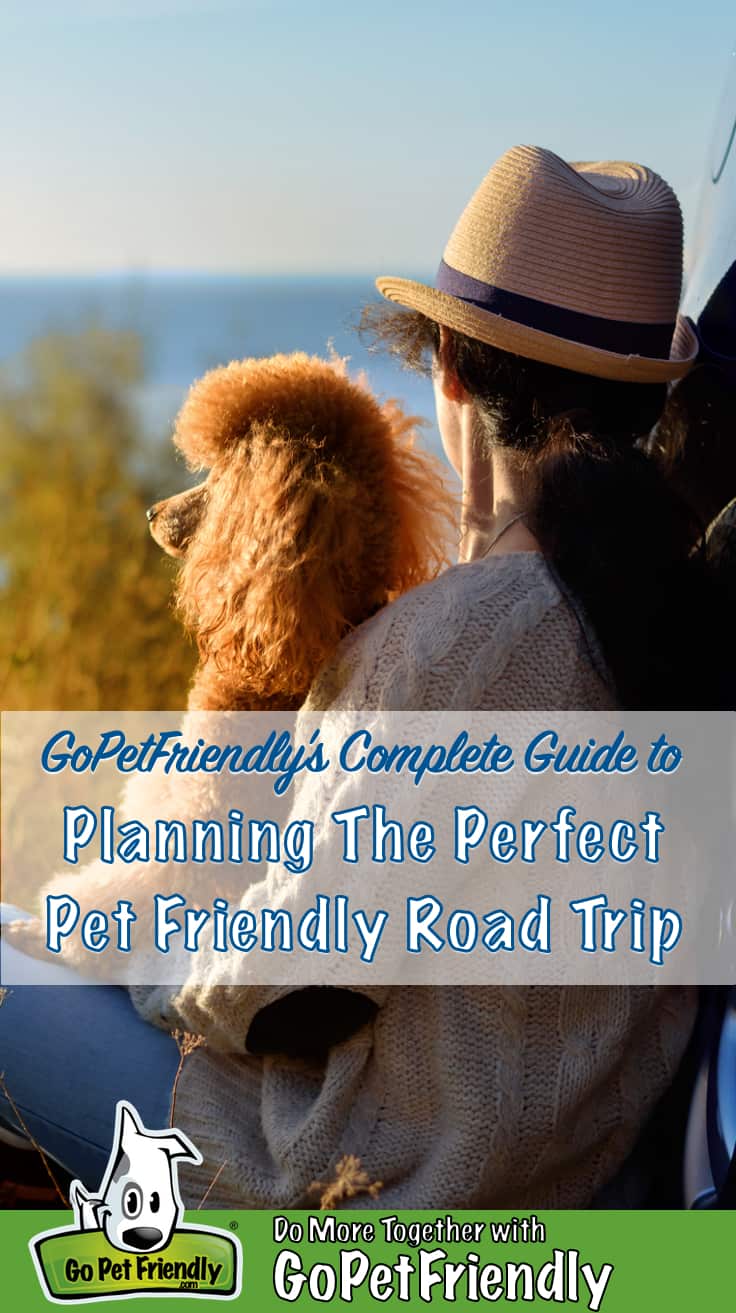
You can almost feel the wind in your hair (or fur). And just imagining all the new sights and scents along the way is giving you goosebumps. It’s going to be fantastic! But before your next road trip with pets, there’s some work to do. We’ll walk you through the steps to planning a pet friendly road trip that you’ll never forget.
Steps To Planning A Pet Friendly Road Trip
Step 1: Choose Your Destination
The first thing to decide when planning your road trip is where to go! If you’re moving, visiting family or friends, or traveling for some other purpose, the end point of your trip might already be set.
If you’re planning a vacation and the options are wide open, choosing a destination can feel overwhelming. Start by imagining your perfect getaway. Do you see yourself relaxing on the beach? Hiking a mountain trail? Admiring the landscape at a pet friendly national park? Picturing yourself in your ideal location will help you determine the “goal” of your trip.
READ MORE ⇒ Best Dog Friendly National Parks in America
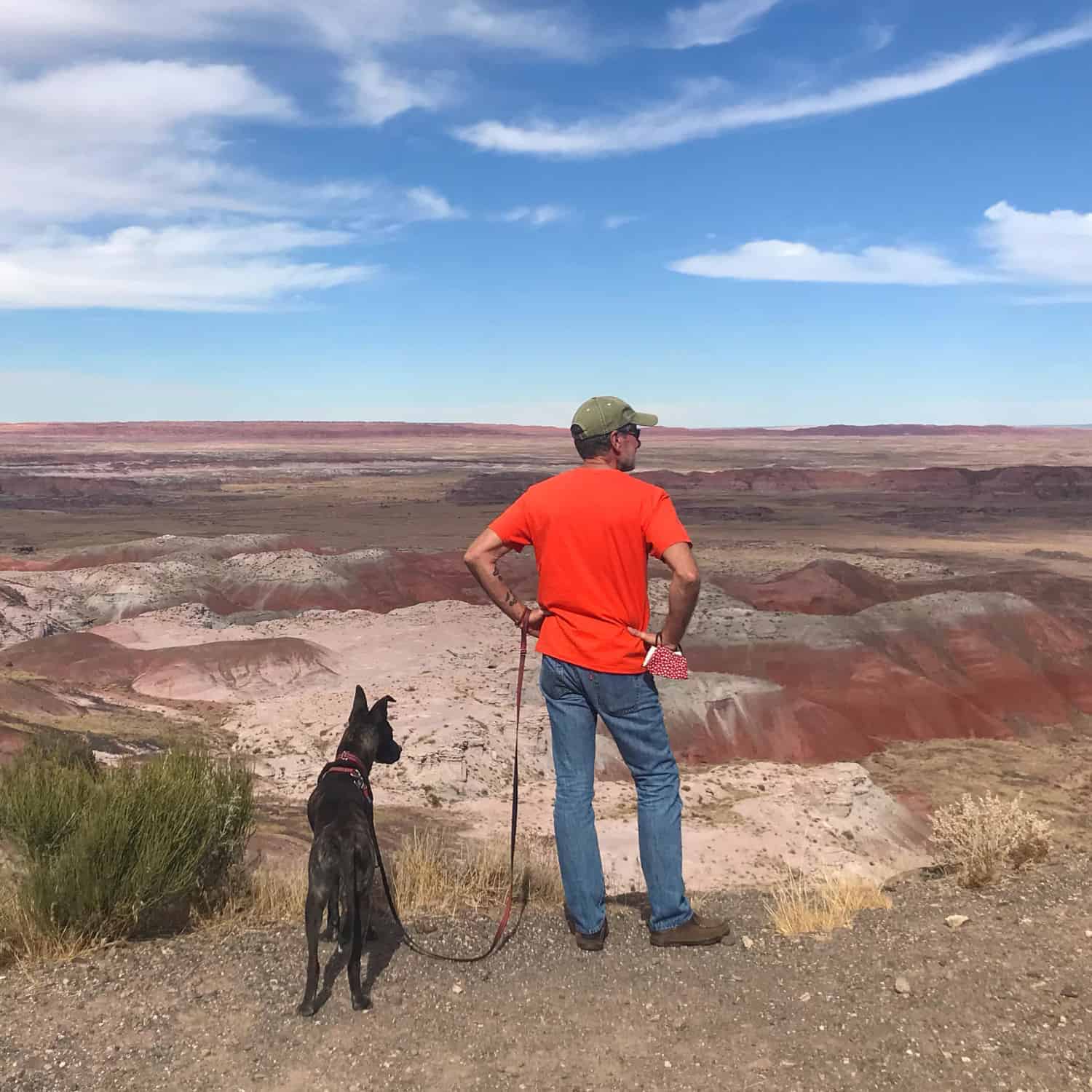
Next, decide how many days you’ll be away and how many of them want to spend driving. Maybe you want to make a bee-line to and from your destination, maximizing the amount of time you spend there. Or perhaps the joy is in the journey, and you want your road trip to have shorter driving, lots of breaks from the car, and the opportunity to explore some sights along the route.
There is no right or wrong answer. In fact, we’ve done both types of trips! And we’ve found that it’s also important to consider your pet’s needs when determining your dog friendly road trip style.
Puppies and dogs on their first road trip might appreciate more frequent stops and shorter driving days. Whereas well-traveled pets might be comfortable with longer trips while they sleep for long stretches in the car.
The time of year you’ll be traveling might also impact your decision. Road trips in the winter, when the weather can be unpredictable, might call for longer drives while the conditions are good. Summer trips, on the other hand, might have you breaking up the day. You could spend the cooler mornings and evenings enjoying the sites, and do your driving in the afternoon when the temps are highest.
The most important thing is to plan your road trip so that you and your pets enjoy the journey. Whether you’re an early riser or prefer to sleep in and then linger over your morning coffee — everyone is different, so do what makes you happy! Once you choose your destination and decide how much time you’ll take getting there your road trip plan will start taking shape.
READ MORE ⇒ The Ultimate Pet Friendly American Road Trip
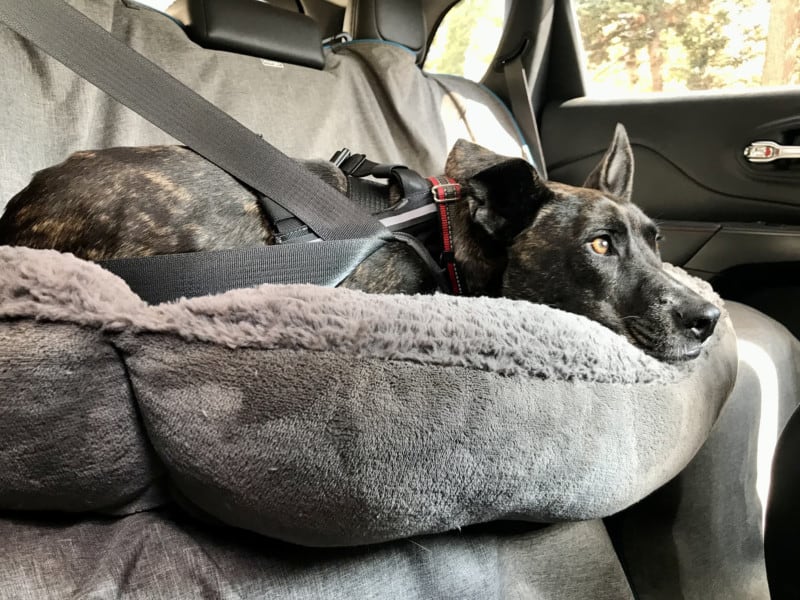
Step 2: Envision Your Route
It’s totally old-school, but I believe the best way to plan a cross country road trip is on a paper map. So pick up a road atlas or grab maps of the states you’ll be visiting and let’s get started!
READ MORE ⇒ Route 66 – Pet Friendly Sights From Chicago to Santa Monica

Planning your road trip on a real map gives you a great visual of your route. It also makes it easy to prioritize when several interesting attractions are located close together. Laying out your plans on a map also gives you perspective on the distances you’ll be traveling each day and helps you keep in mind what’s coming up down the road.
Find your beginning and ending points and start by highlighting the most direct route between where you are and where your road trip will take you. Then, using different colors, circle places along the way that you might visit — from stops you REALLY want to see, to places that could make convenient breaks.
Keep in mind that the most direct route isn’t necessarily the best way to go. Your road-tripping style and the amount of time you’re planning to spend traveling will determine whether you’ll be sticking to the highways or taking the backroads.
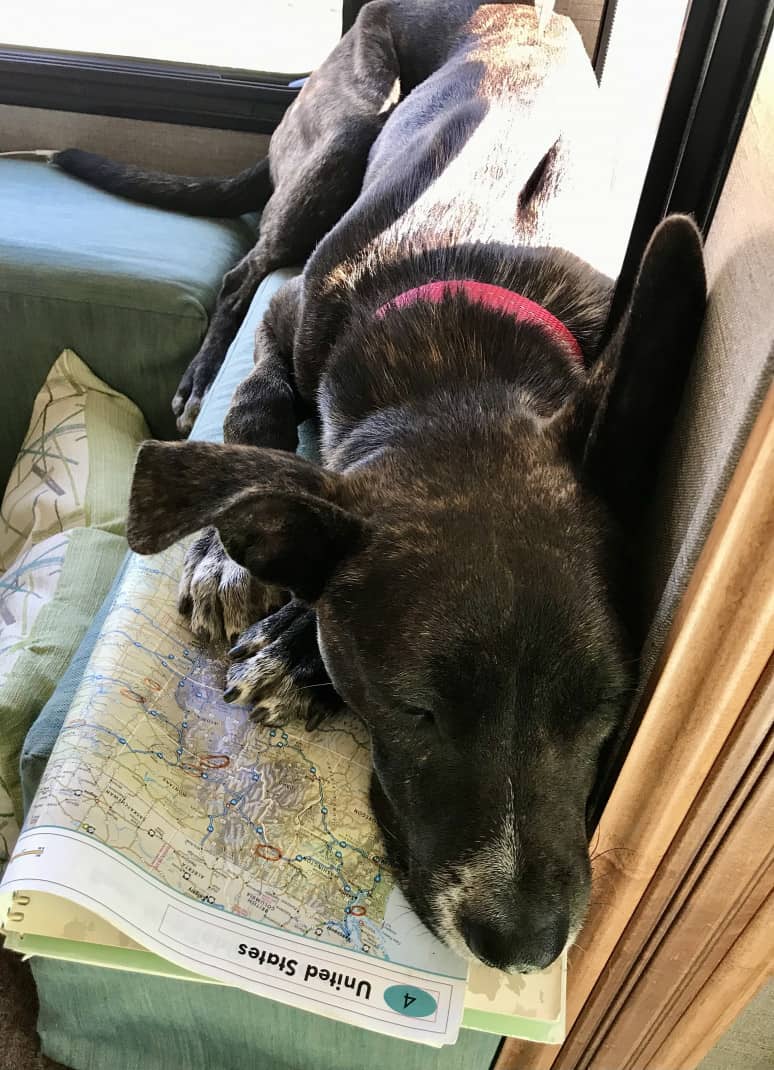
Step 3: Plan Your Stops
The most common mistake people make when planning a road trip is trying to do too much. It’s a problem with the way our brains work. We find the most popular 1,000 things to do, pack it all into a one-week itinerary, make the reservations, and then freak out when things go sideways. That’s no way to spend a vacation!
Flexibility is key when you’re traveling with pets. The weather might not be ideal on the day you planned to hike. Or, you could decide that you just want to lay on the beach on the day you scheduled a guided walking tour. So, tread lightly when planning your stops.

We prefer to keep a list of “ideas” and only make reservations for things that will ruin our road trip if it’s booked up when we get there. In reality, you can often call at the last minute and find availability for at most places. And with no deposits to lose, you’ll feel more free, which is what vacations are about, after all!
While we recommend underestimating how much you can do, we also encourage you to keep your trusty road trip map and “list of ideas” handy. If you’re fortunate enough to have some free time, check your map to see what’s close and allow serendipity to fill the gaps in the most spectacular ways!

Step 4: Book Where You’ll Stay
One thing you will want to book in advance is where you’ll staying during your road trip. Reserving pet friendly hotels, vacation rentals, or campgrounds can be a tricky proposition, and not having your accommodations lined up can cause a lot of stress.
As you review the map you’ve been marking up, calculate the time it will take to drive between different points along the route. Add some time for bathroom breaks, eating, and filling the car with gas. Also consider the time you’d like to spend at attractions and rest stops along the way.
Then, using all of this information, decide where you want to end each day of your road trip and circle those locations on the map.
READ MORE ⇒ Pet Policies For All U.S. Hotel Chains
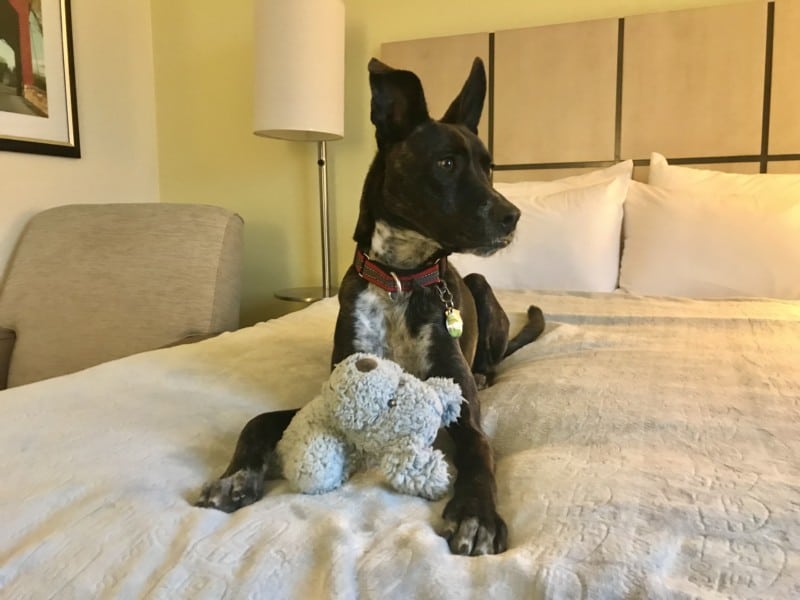
With the locations where you’ll be spending the night determined, you can start searching for pet friendly lodging. GoPetFriendly is a great place to start! Type in the name of the city you’ll be visiting, then click “Lodgings” at the top of the page. You can compare the pet friendly hotels and accommodations available, as well as their pet polices. From there, you can explore pet friendly restaurants, activities, and service providers in the area.
While more and more accommodations are welcoming pets, not all places are equally pet friendly! These questions will help you narrow down the best places to stay with your pet:
Do you accept pets?
Hotel and vacation rental pet polices change quickly, so it’s important to verify that the property you’re considering still welcomes pets.
Are some areas off limits to pets?
Pets are generally not allowed in breakfast areas, restaurants, pools, and fitness rooms. Ask up front and be sure you can live with the pet policies and restrictions.
Do you charge additional pet fees?
This is where pet friendliness really shows. Some hotels welcome pets to stay for free, while others heap on additional charges that can add up to more than the nightly room rate!
Be sure you have a clear understanding of the cost before making your reservation. Determine whether the fee is per night or for the entire stay, and whether it’s per pet or fixed regardless of the number of pets. Also ask if any portion of the fee is refundable if the hotel room isn’t damaged during your stay.
READ MORE ⇒ Hotel Chains Where Pet Stay Free
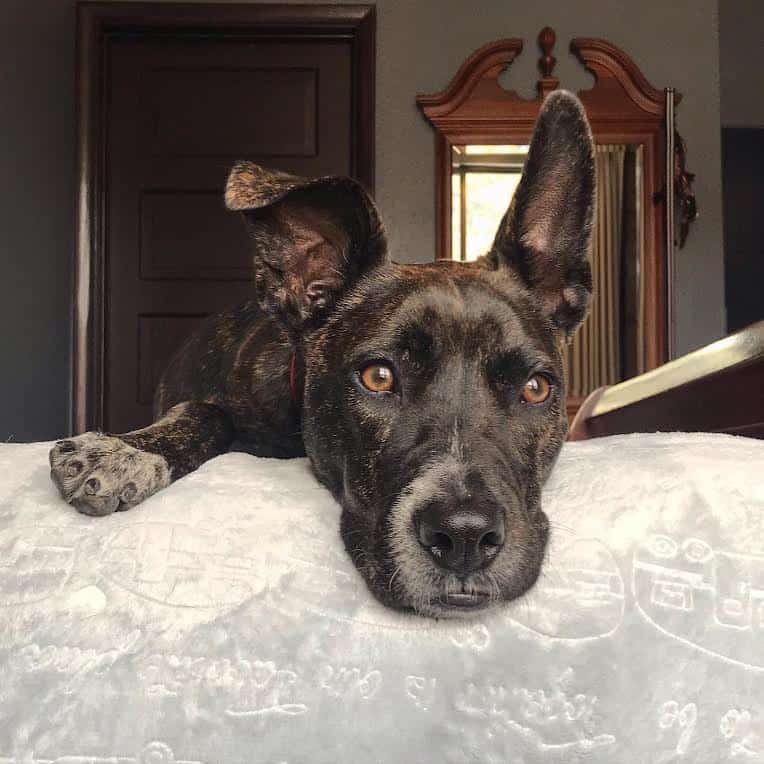
Are there any weight or breed restrictions?
It’s common for accommodations to impose weight restrictions. If you’ve found an option that’s a perfect in every way – except that your pup is a little too big – ask if they’ll make an exception. Most hotels have a little wiggle room in their size limitations and will try to accommodate you when asked.
How many pets are allowed per room?
When you travel with multiple pets, this is an important consideration. Some pet friendly hotels only allow one pet per room.
Can pets be left unattended?
Determining whether you can leave your pet alone in the hotel room while you step out for something to eat or to run an errand helps you plan appropriately.
Hotels are primarily concerned with two things when pets are left unattended: damage to the room, and barking that disturbs other guests. To alleviate those concerns, some hotels require crates for pets when you’re away. And following our tips for a quiet stay will help ease any worries about barking.
What pet amenities does the hotel offer?
The most important amenity is always a convenient, grassy pet relief area. But some pet friendly hotels also provide treats at check-in, pet beds and bowls in the room, doggy room service menus, spa treatments, and pet sitting services.
It’s always a nice treat when your hotel has a restaurant with a pet friendly patio. And some dog friendly hotels even host a “yappy hour” in the lobby each evening! Deciding how much to pamper your pet is entirely up to you. Another nice perk to ask about is whether there’s a dog park nearby!

Step 5: Prepare Your Vehicle
With your route planned and your accommodations booked, the next step is making sure your car is “pet ready.” Coming home together safely is the most important part of any trip, so be sure you have a way of securing your pet while you’re traveling.
A crate, carrier, or car harness will prevent your pet from making an unannounced visit to check the view from the back seat or your lap while you’re driving, and will protect you both in case of an accident.
READ MORE ⇒ Best Crash-Tested Dog Harnesses For Traveling By Car
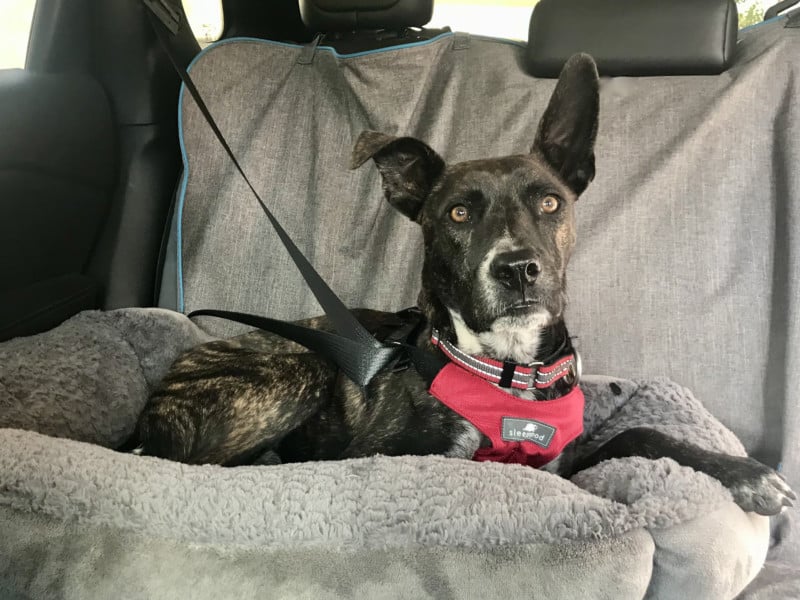
If you’re using a crate or carrier, be sure it’s attached to the floor or the seat belt so it doesn’t become a projectile in an accident. Also remember to deactivate the airbag for any seat your pet will be occupying.
If your pet isn’t used to buckling up in the car, the sooner you get him comfortable with the idea, the better!
Start by allowing him to explore his new carrier or crate, or wear harness, in the house. As he gets more familiar with his new travel gear, take him for short drives to fun places. Take it slow, and before you know it, he’ll be road trip ready.
Step 6: Talk To Your Vet
When planning your road trip, call your veterinarian to confirm that your pet’s vaccinations are up to date and discuss any possible health concerns that might exist where you’ll be traveling.
Also ask about possible remedies for car sickness, diarrhea and restlessness – just in case!
Finally, consider having your pet micro-chipped, or update your contact information if your pet’s already chipped. It would be a nightmare, but pets do become separated from their people while traveling. Shelters, animal hospitals, veterinary clinics and humane societies have scanners that read the chips, so they can quickly notify you of your pet’s recovery.
READ MORE ⇒ What To Do If Your Puppy Gets Motion Sickness
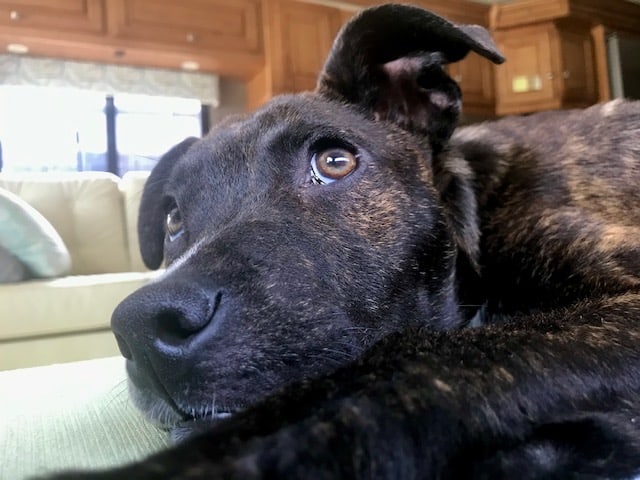
Step 7: Polish Your Pup’s P’s and Q’s
You can avoid embarrassing and potentially dangerous situations by teaching your dog reliable Come, Heel, Quiet, and Settle commands. Practice is the key!
Before setting out on your road trip, test your progress somewhere with a lot of distractions, like an outdoor café, beach, or dog park.
READ MORE ⇒ Training Your Dog To Travel
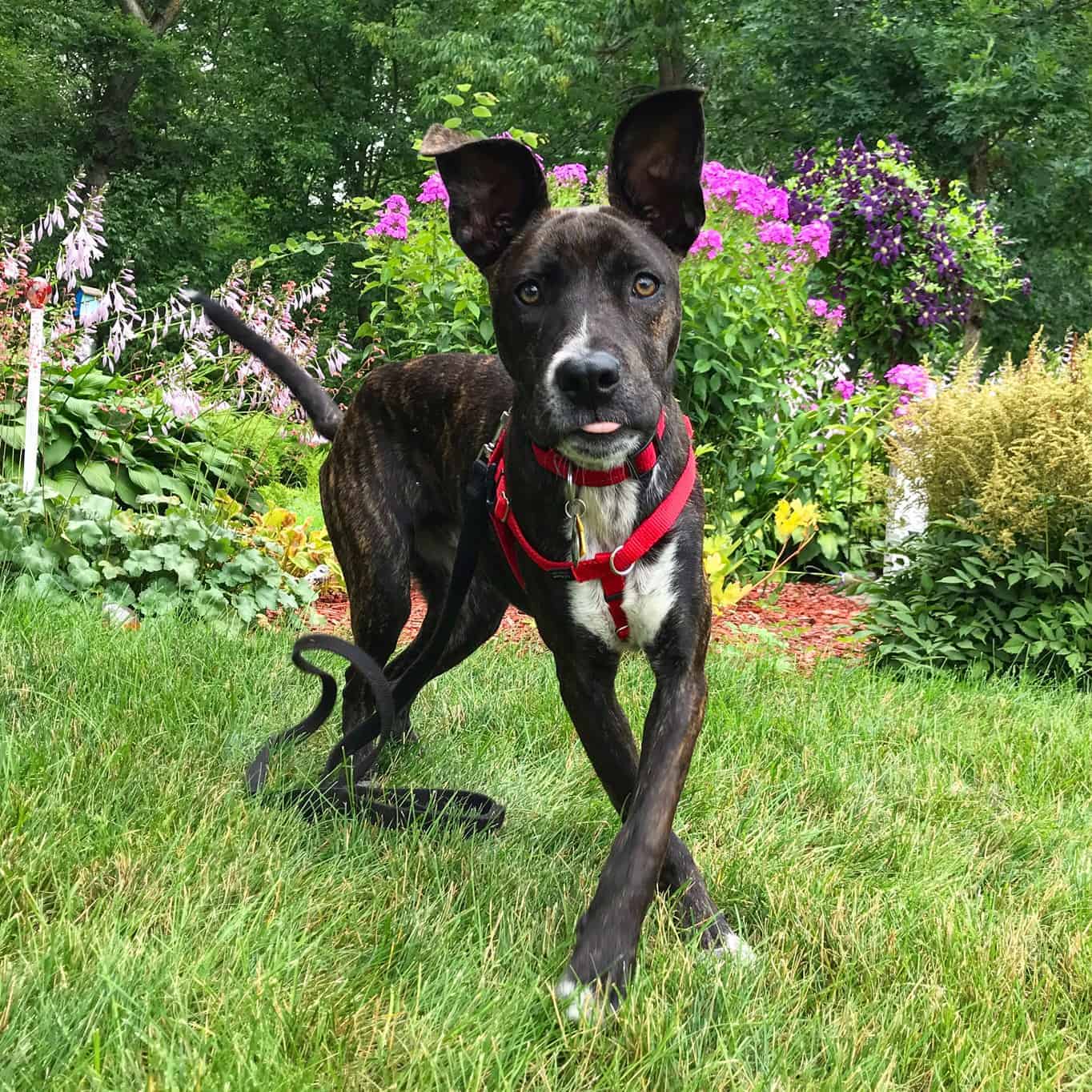
Step 8: Gather The Gear
Pets need a lot of stuff when they go on vacation! This checklist will help you gather the things you’ll want to take along for your furry friend.
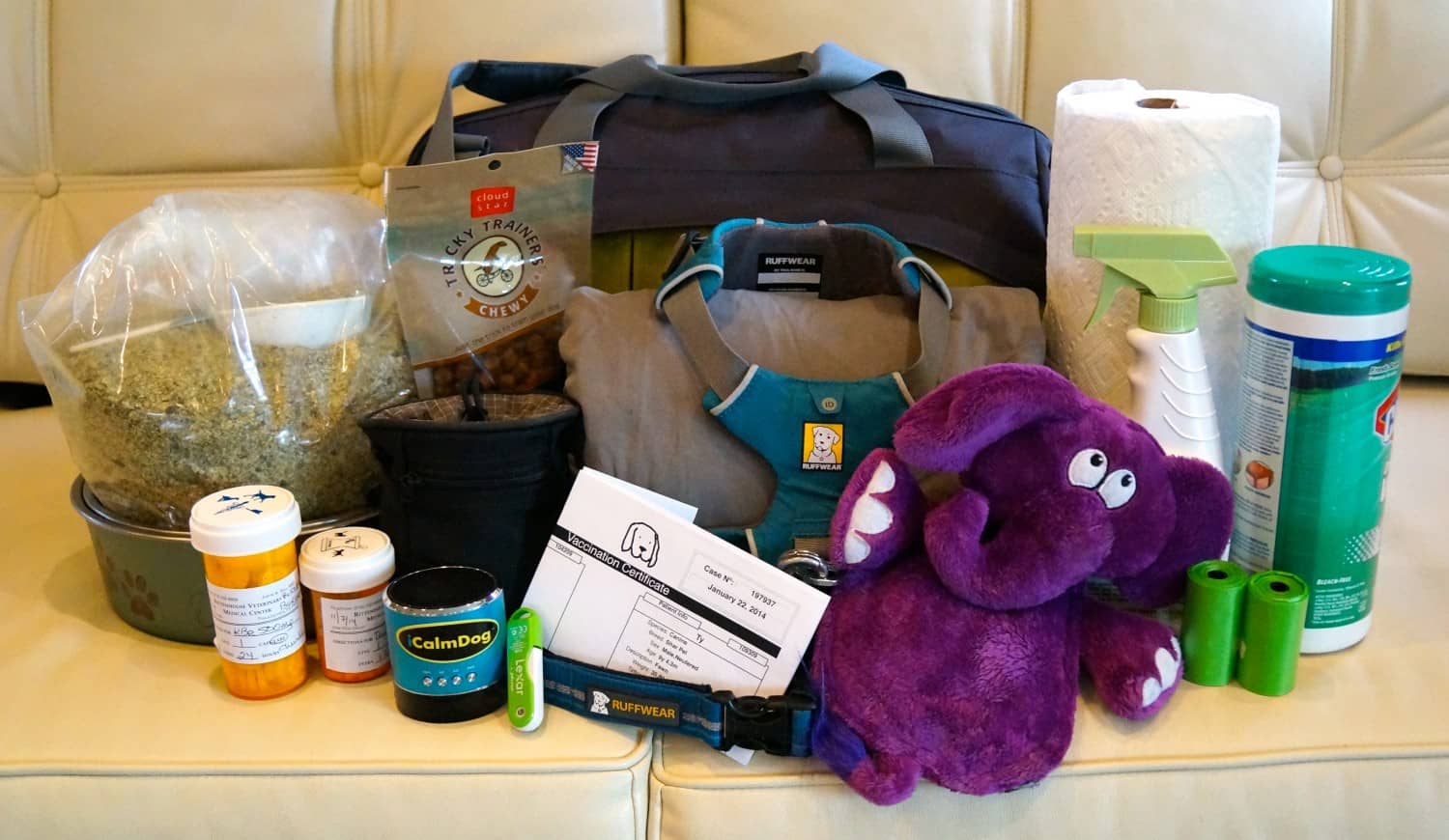
- Food and Treats – For canned food, don’t forget the can opener!
- All Medications, Vitamins, and Supplements – Bring any monthly medications that your pet will need to take while you’re away.
- Drinking Water – If your pet’s stomach is easily upset, take along drinking water from home.
- Food and Water Bowls
- Your pet’s Bed and a couple of Toys
- Current Identification Tag – Include your cell phone number or other phone number where you can be reached while you are away.
- Leash – Many places require your pet be on a leash no longer than six feet. If you want to give your pet more freedom and exercise, but not risk being off-leash, pack a long-line leash as well.
- Waste Bags
- Litter Box and Litter for cats
- A roll of Paper Towels for muddy paws and other messes
- An old Towel in case of rain or after swimming
- First Aid Kit
- Proof of Vaccinations
- Medical Records – Scan all important documents to a USB drive and you’ll have them with you in case your pet gets sick or injured.
- Photos of your Pet – In case you get separated, have a current photo handy so you can create posters quickly.
READ MORE ⇒ What Should You Pack When Traveling With Your Cat?
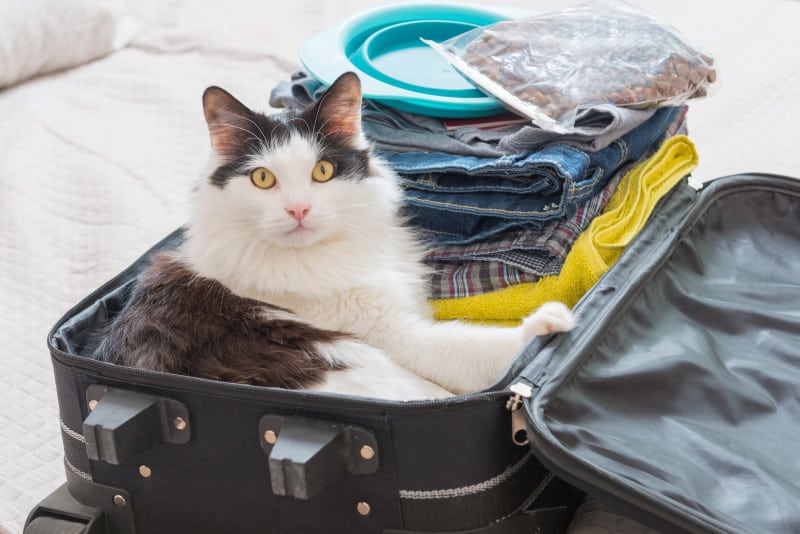
Step 9: Stick To The Routine
Whether they show it or not, many pets feel anxious when they’re away from home. You can help relieve their stress by sticking to your pet’s normal feeding and exercise schedule.
Set an alarm to remind you when meal time is approaching. And plan time each day to let your dog stretch, run, and burn off some energy. Because it’s their vacation, too!
Setting aside time for a nice walk before you hop in the car and another stroll at the end of the day means you’ll have less time behind the wheel. But experiencing the places you stay with your pet is part of the fun of road tripping together!
Making more frequent stops is also part of traveling with your pet. Figure on taking a break from driving every two hours or so to let your pup stretch his legs, sniff what’s new, and get a drink of water.
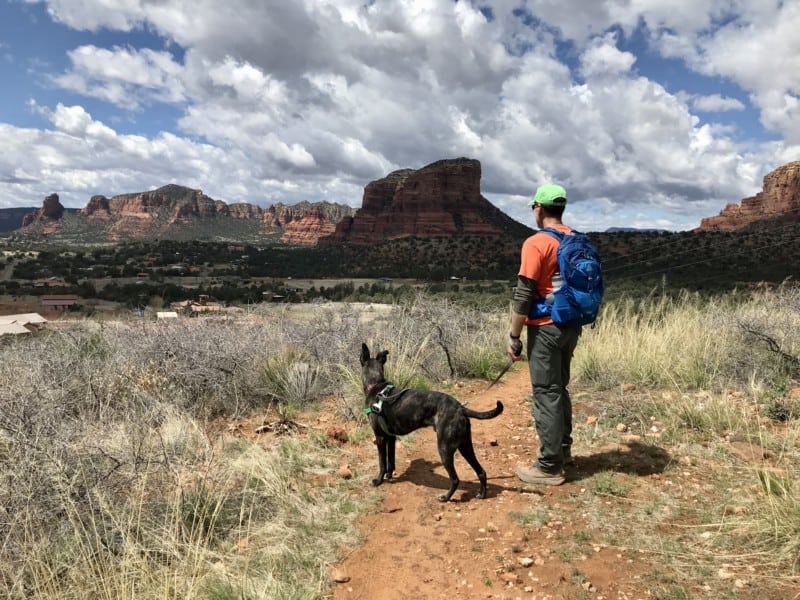
Step 10: Roll With It
No matter how much effort you put into planning your pet friendly road trip, things sometimes go wrong. When they do, you can choose to let it ruin your day, or see it as a new adventure.
Pets are great teachers in that they’re never attached to the outcome. Where you end up, how many places you see along the way … it’s all irrelevant to your pet. He just wants to be with you and have fun.
If you can embrace that mindset, you’ll see every detour as an opportunity, and you and your pet will grow closer for the experience.
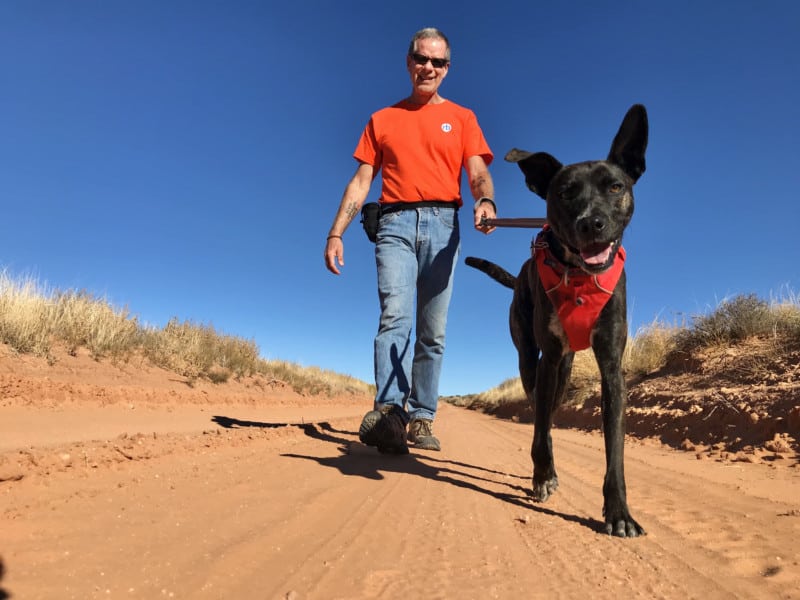
Remember To Be Considerate
When you travel with your pet, you are an ambassador for all pet travelers – so make a good impression! Abide by the rules of the places you visit, always keep your pet on-leash, and clean up after him.
The inconsiderate behavior of a few can lead to unfortunate repercussions for future pet travelers and local pet owners.

This advance preparation takes some time, but it’s the secret to planning a pet friendly road trip that’s enjoyable for everyone. And, most importantly, you’ll be making memories with your best friend that will last a lifetime.
Waggin’ trails!
(Visited 17,208 times, 9 visits today)

